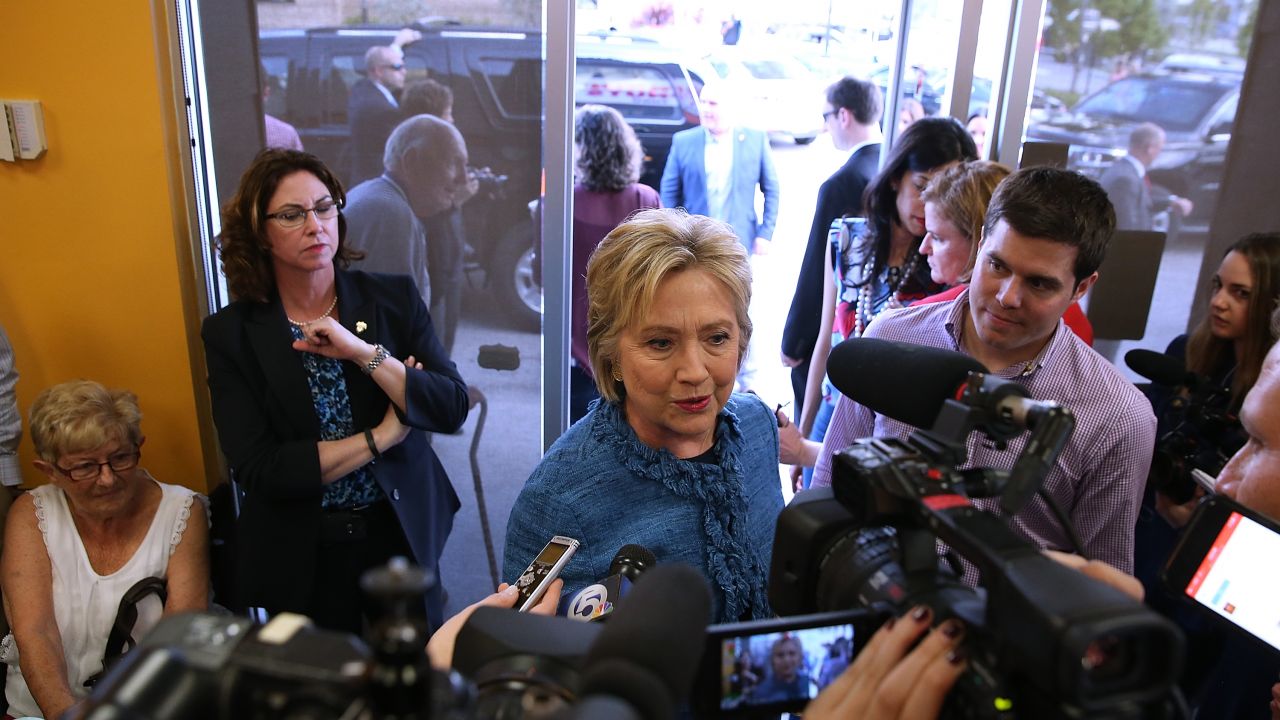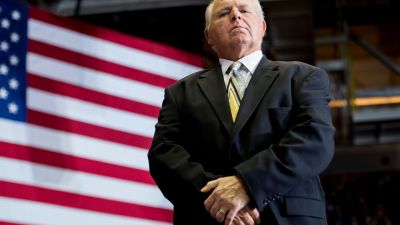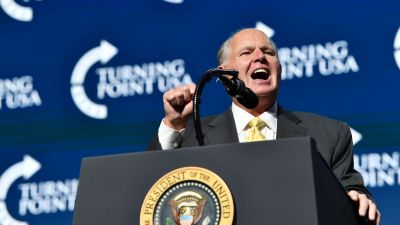
Democratic presidential candidate Hillary Clinton talks to members of the media during a visit to a Dunkin' Donuts on March 15, 2016 in West Palm Beach, Florida. (Photo by Justin Sullivan/Getty Images)
As the political pundits keep reminding us, this might be called the “hate” election. Both major parties’ presumptive nominees, Donald Trump and Hillary Clinton, have historically high net unfavorable ratings – so high that voters are said to be casting their ballots against a candidate rather than in favor of one. The question seems to be: Whom do you hate less?
But this narrative, which threatens to be the dominant one of this political season, has two flaws. In the first place, none of the candidates has had particularly high favorability ratings this campaign – not Cruz or Sanders or Jeb Bush or even the anointed one, Marco Rubio. Only John Kasich would qualify as “popular,” if a paltry net favorability of 12 percent makes you so.
So Trump’s and Clinton’s ratings are the equivalent of, say, the batting averages during a baseball season in which no one is hitting very well. Americans are just in a very surly, unreceptive mood. They hate everybody.
The second flaw is that the candidates’ unfavorability ratings set up yet another false equivalency: that Trump and Clinton have somehow earned their enmity in equal measure – Trump for his racist, sexist, bullying remarks, his endless prevarications and his general depreciation of the entire political process, and Clinton for… well, Clinton, apparently, for having used a private email server for communications that only later were classified. See? They’re two peas in a pod.
But within this very angry electorate is another hate boiling, and it may very well alter the course of the election. That is the hate the public feels for the media, especially the mainstream media.
Many of us remember a time when the MSM actually were held in high regard — when CBS News anchor Walter Cronkite was among the most respected men in America, and when Woodward and Bernstein were lionized for helping save democracy from the undemocratic depredations of Richard Nixon. As late as 2005, according to a Gallup survey, more than 50 percent of Americans trusted the media either a “great deal” or a “fair amount.” Not any more. Last year that figure was 40 percent, with the severest doubts among the young.
In their 2013 analysis of the media, the Pew Research Center found a similar distrust and respondents enumerated several reasons why: bias, of course (76 percent felt the media took one political side over the other); outside influence (75 percent felt the media were subject to these influences); inaccuracy (67 percent); and the media’s fascination with stories that the respondents deemed unimportant (65 percent). These numbers, Pew added, were either at or near all-time highs.
But within these numbers there is something interesting. While no one seems to love the MSM the way they did back in the 1960s and 1970s, Republicans like them a lot less than Democrats do. Gallup found that 55 percent of Democrats continue to trust the media, but that trust is shared by only 32 percent of Republicans. And Pew found another partisan disparity, and one significant anti-MSM cavil: Democrats still believe that the press protects democracy rather than harms it, 59 percent to 27 percent, while Republicans believe news organizations hurt rather than help, 46 percent to 43 percent. So basically, a plurality of Republicans has ceased to believe in what had always been one of the primary functions of the media: to serve the democratic process.
This is important because while Republicans have worked tirelessly to destroy the public’s confidence in government – to the point where government now barely functions – they also have been working to destroy public confidence in the idea of an objective media. This has perhaps been a more subtle effort, but it is one with equally profound implications for our political life.
We know why Republicans did this: they have an impossible time with fact and truth. But if you destroy belief in objectivity, you destroy the media’s ability to successfully examine and criticize. The embrace of illogic and unreason – everything from climate change denial to birtherism — by huge numbers of Republicans is facilitated by the fact that there is, in the public’s mind, no credible instrument to challenge them. And unfortunately, rather than push back and defend the ideal of objectivity, the press have caved by substituting balance instead, which in practice simply means that you treat both sides equally whether they’re equal or not. Remember, Fox News’ slogan has been “fair and balanced,” not “honest and objective.”
So, yes, in their own suicidal way the press has contributed to the level of distrust, but nowhere near as much as Republican elites. Georgetown University professor Jonathan M. Ladd, in his 2011 book Why Americans Hate the Media and How it Matters, discovered that the Republican elite’s criticism of the media was more responsible than any other factor in denigrating the media among educated conservative Republicans. (For Democrats, it was the abundance of tabloid-style coverage.)
So the destruction of the MSM began at the top, certainly with the right-wing’s own media, Fox News and the radio blatherers, but also presumably among many of the same people who now decry Trump. I don’t want to say the chickens are coming home to roost for the intellectuals among those conservative elites, but the trouble with destroying the idea of press integrity is that once it’s gone, you cannot just revive it to take on a potentially fascist demagogue when you need to.
But over the years, Republicans managed to do something else besides eroding confidence in the press – a lack of confidence, as I have said, that many Democrats share. They turned the press into the enemy of the people. If the first left the media helpless to criticize the right because they supposedly lacked credibility to do so, the second made the media into a kind of recruiting and fomenting tool for all those disgruntled right-wing white men who are the primary audience for Fox News and the foundation of today’s Republican Party. You see this media baiting on Fox News all the time and also at Trump rallies, where the media are literally penned in – in some ways, for their own protection. Indeed, few techniques are more effective for rousing the disaffected than press hatred.
To be honest, this is a brilliant bit of demagogic trickery. Every time the press scrutinizes you, you can not only sneeringly dismiss them as the “liberal media,” which immediately renders all scrutiny feckless, but you also can turn their attacks on you back on them. By now, this is Republican boilerplate. Spiro Agnew tried it more than 45 years ago with his “nattering nabobs of negativism” – those who had the audacity to criticize Nixon over his Vietnam policy.
Sarah Palin tried it, too. Eight years ago, she invoked the idea that there were “real” Americans and then there were elites; that the media were among the elites; and that when the press attacked her, they were really attacking those real Americans for whom she was a proxy. It was philistine cultural warfare.
Trump is making himself into the same kind of proxy, and he is likely to be far more successful than Palin, who was fighting to define herself at the same time the press was defining her. Trump already is well defined — armed, locked and loaded to go after a critical press who are not really just attacking him but all those Americans who love him. Dan Zak saw the irony of it all this week in his Washington Post profile of Donald Trump’s sons. “The media that made Donald Trump a celebrated patriarch,” he wrote, “and the process that has delivered him to the doorstep of the White House, are the enemies. You can’t have loyalty without an enemy, after all.” Absolutely. And if you wonder whether this tactic could have any traction beyond stirring up seething Republicans who already hate the press, think of this: According to that Gallup poll, only 32 percent of independents trust the media.
That gives Trump two opponents in the fall: Hillary Clinton and all those media types who have been less than cordial to him – a group that includes many in the conservative intelligentsia who dread the thought of a Trump presidency. And it gives his supporters two targets to hate – two to feed their fury. Make this a referendum about the media as well as about Clinton, and you up your chances to win.
Criticizing Trump, then, is a potential trap, and the media are either going to walk right into it, or try to tiptoe past it. We are seeing some example of the former as the press, in a panic, have begun to attack not just Trump, but his supporters.
Fox News telecast a prime example of the tiptoeing earlier this week when one-time Trump antagonist Megyn Kelly conducted a powder-puff interview with him that seem designed, first and foremost, to sell her new brand as the next Barbara Walters, and her forthcoming book, and second, to normalize Trump into a sweetie-pie.
We are likely to get a lot of this sort of normalization cum capitulation, both because this is the way the media now operate in terms of party politics, if not in terms of individual candidates (balance, you know), and because most of them, I suspect, don’t have the guts to be in Trump’s crosshairs once he is the GOP nominee, even if they feel he poses an existential threat to the country. Years of Republicans bashing you will do that.
Ultimately, one suspects Donald Trump will be just as happy with the enmity as with the fawning. He knows he could ride both right into the White House.




